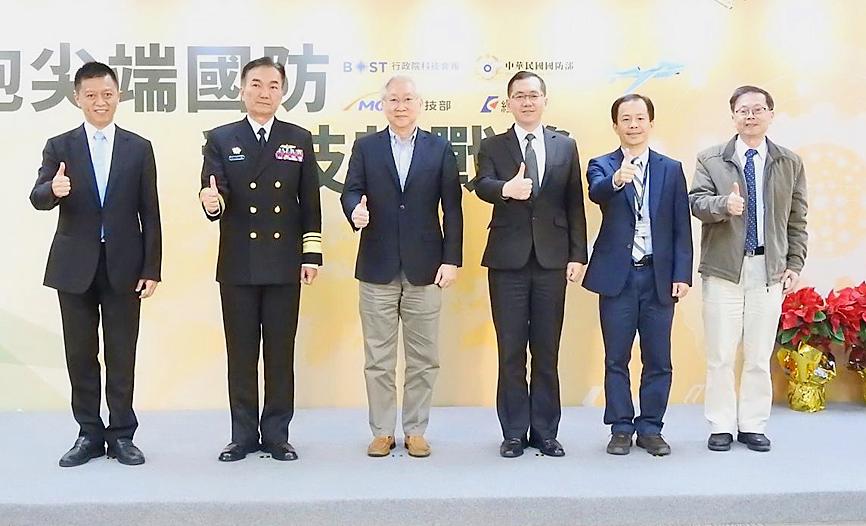The government is to budget NT$5 billion (US$175.6 million) over the next five years to promote a program on the research and development (R&D) of defense technologies at local universities, the Ministry of Science and Technology and the Ministry of National Defense announced yesterday.
The program prioritizes seven research areas: information and communications technology and smart technology; key system analysis and integration; advanced sensors and precision manufacturing; advanced propulsion systems and aerial vehicles; advanced system engineering; advanced vessels and underwater vehicles; and new material and mechanics research, the science ministry said in a news release.
The two ministries would each contribute half of the budget, Executive Yuan Office of Science and Technology Deputy Executive Secretary Andrew Yeh (葉哲良) told a news conference in Taipei.

Photo: Yang Mien-chieh, Taipei Times
In the past, defense technology was mainly developed to meet the needs of the military’s army, navy or air force branches, but now emphasis is increasingly being placed on information security and robotics amid growing demand for civilian applications and interdisciplinary talent, Yeh said.
While the military-affiliated Chungshan Institute of Science and Technology has its own information security projects, it is less sensitive to new trends in academia, and the program aims to fortify its connections, he said.
Giving an example, Yeh said that very few countries are capable of making advanced lithium batteries used in submarines and hopefully Taiwan could be among the top five countries that can produce them.
The two ministries plan to recruit 150 graduate students over five years, with each student receiving a monthly grant of NT$30,000 to NT$60,000, he said.
Foreign students cannot join the program, he added.
Universities interested in the program can submit applications to the science ministry by Tuesday, he said, adding that the ministry plans to select three to six schools to establish research centers for the program.
The promulgation of the Defense Industry Development Act (國防產業發展條例) last year shows the need for more long-term talent cultivation programs in the coming decades, Minister of Science and Technology Wu Tsung-tsong (吳政忠) said.
Technologies related to artificial intelligence, 5G and even 6G communications, Internet of Things, as well as quantum computing, are key to defense technology development, Wu said, encouraging students to study in the related fields.
The defense ministry has over the past two months met with faculty and students at National Taiwan University and National Cheng Kung University to promote defense technology, Deputy Minister of National Defense Vice Admiral Lee Tsung-hsiao (李宗孝) said.
Many experts on defense technology have worked at the Chungshan institute, while students in the new program would also be able to seek employment in the private sector, he said.

Chinese spouse and influencer Guan Guan’s (關關) residency permit has been revoked for repeatedly posting pro-China videos that threaten national security, the National Immigration Agency confirmed today. Guan Guan has said many controversial statements in her videos posted to Douyin (抖音), including “the red flag will soon be painted all over Taiwan” and “Taiwan is an inseparable part of China,” and expressing hope for expedited reunification. The agency last year received multiple reports alleging that Guan Guan had advocated for armed reunification. After verifying the reports, the agency last month issued a notice requiring her to appear and explain her actions. Guan

GIVE AND TAKE: Blood demand continues to rise each year, while fewer young donors are available due to the nation’s falling birthrate, a doctor said Blood donors can redeem points earned from donations to obtain limited edition Formosan black bear travel mugs, the Kaohsiung Blood Center said yesterday, as it announced a goal of stocking 20,000 units of blood prior to the Lunar New Year. The last month of the lunar year is National Blood Donation Month, when local centers seek to stockpile blood for use during the Lunar New Year holiday. The blood demand in southern Taiwan — including Tainan and Kaohsiung, as well as Chiayi, Pingtung, Penghu and Taitung counties — is about 2,000 units per day, the center said. The donation campaign aims to boost

The Kaohsiung Tourism Bureau audited six hotels in an effort to prevent price gouging ahead of Korean band BTS’ concert tour in the city scheduled for Nov. 19, 21 and 22 this year. The bureau on Friday said that the audits — conducted in response to allegations of unfair pricing posted on social media — found no wrongdoing. These establishments included the local branches of Chateau de Chine, Hotel Nikko, My Humble House, and Grand Hai Lai, it said, adding that the Consumer Protection Commission would have penalized price gougers had the accusations been substantiated. The bureau said the Tourism Development Act

The Central Weather Administration (CWA) said a magnitude 4.9 earthquake that struck off the coast of eastern Taiwan yesterday was an independent event and part of a stress-adjustment process. The earthquake occurred at 4:47pm, with its epicenter at sea about 45.4km south of Yilan County Hall at a depth of 5.9km, the CWA said. The quake's intensity, which gauges the actual effects of a temblor, was highest in several townships in Yilan and neighboring Hualien County, where it measured 4 on Taiwan's seven-tier intensity scale, the CWA said. Lin Po-yu (林柏佑), a division chief at the CWA's Seismological Center, told a news conference